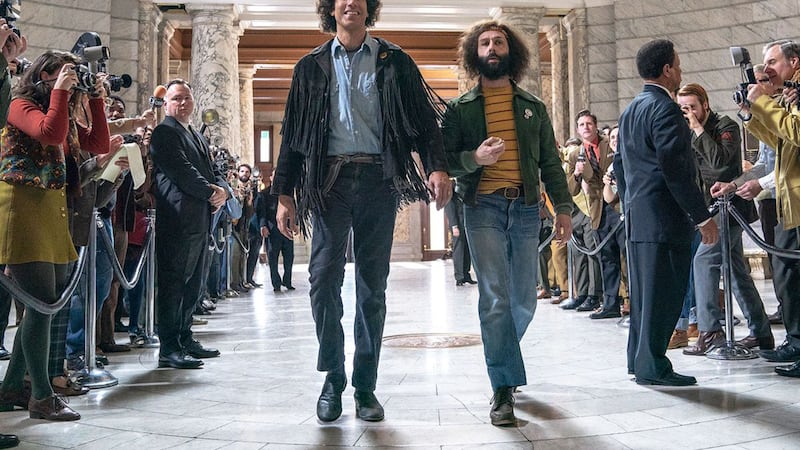The Trial of the Chicago 7
**** Anyone who thinks nonstop talk can't be cinematic hasn't seen an Aaron Sorkin movie. Sorkin (who won an Oscar for writing The Social Network) is living proof that film is both a visual and a verbal medium. Actors tear through his tender-witty-wrathful writing as if attacking crisp, chewy steaks—and the stars of his courtroom epic The Trial of the Chicago 7, which he also directed, are no exception (the cast includes Yahya Abdul-Mateen II, Sacha Baron Cohen, Eddie Redmayne and Joseph Gordon-Levitt). The film is set mostly in the late '60s, when seven antiwar activists were accused of conspiring to incite a riot at the 1968 Democratic National Convention in Chicago. The bravery of the brutalized defendants is justly legendary, but the film is no self-righteous history lesson. The script is stocked with zingers ("This is the Academy Awards of protests and as far as I'm concerned, it's an honor just to be nominated," one defendant says of the trial) and Sorkin's depiction of patriotism curdling into fascism is visceral, not didactic—Frank Langella as Judge Julius Hoffman unleashes a nauseating portrait of real-life evil. Sorkin also shows us devastating images of demonstrators being tear-gassed by police, but he doesn't belabor the similarities between 1968 and 2020. He knows when to shut up and let history speak for itself. R. BENNETT CAMPBELL FERGUSON. Netflix.
Chop Chop
** A mold of David Harper's head should appear in every (socially distanced) haunted house in America. Like Boris Karloff (Frankenstein) or Doug Bradley (Hellraiser), the bald, hangdog character actor endows Chop Chop with the most proven horror concept of the past 120 years of film: a very scary-looking man with a sharp object. So when Harper's murderous form appears on the doorstep of a young couple, Liv (Atala Arce) and Chuck (Jake Taylor), the spine tingles in classic fashion. The fact that Rony Patel's would-be slasher film pivots so quickly and aggressively away from an unstoppable-monster bloodbath is potentially to his creative credit, but unfortunately, no part of the disturbed underworld odyssey that follows works anywhere near as well. Chuck and Liv's fly-by-night encounters with a string of sadists in bathrobes recalls the "Gimp" interlude of Pulp Fiction or a swing-and-miss like Hotel Artemis, where fate leads the main characters into alternate hells that suggest an entire universe of pain merchantry just off screen. It doesn't cohere in Chop Chop, and Arce and Taylor reach for a murmuring naturalism that stunts their terror and ours. The nice thing about meat-cleaver menaces—they don't overthink anything. NR. CHANCE SOLEM-PFEIFER. On Demand.
Coming Home Again
** Adapted from a 1995 New Yorker essay by Chang-rae Lee, this quiet little drama by director Wayne Wang follows a young man (Justin Chon) who returns home to care for his cancer-stricken mother. The bones of the story have been told countless times due to its universality, but rarely from the unique perspective of Korean American culture. Filmed mostly using static shots and one-takes, Coming Home Again encourages its audience to bask in the stillness, like gazing into a reflecting pool. It's also devoid of a manipulative dramatic score—emotions are stirred naturally. Yes, this means there are occasional bouts of monotony as we watch Chang-rae cook in silence for minutes at a time. It's intended to be elegiac, since Korean food plays such a crucial role, even if it often comes off a bit stagnant. One dynamic scene in particular stands out, however: Chang-rae runs into an old friend, and after a few minutes of catching up, he inevitably asks how Chang-rae's mother is doing. "She has cancer," he says, then laughs at his own devastation, then apologizes for laughing. This moment defines the spine of the entire film: a poignantly authentic exploration of the complexities of grief, and the pain embedded in its hovering anticipation. NR. MIA VICINO. Virtual Cinemas.
